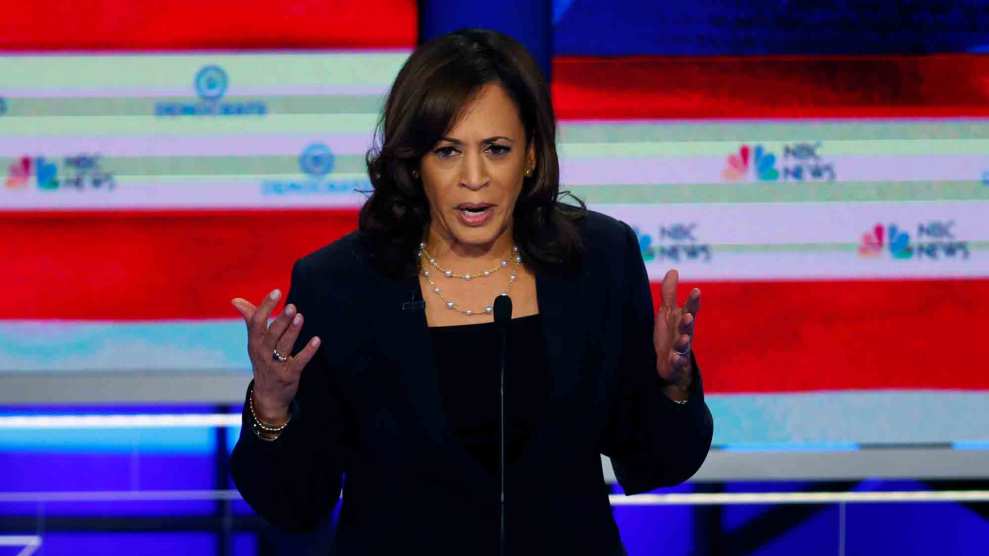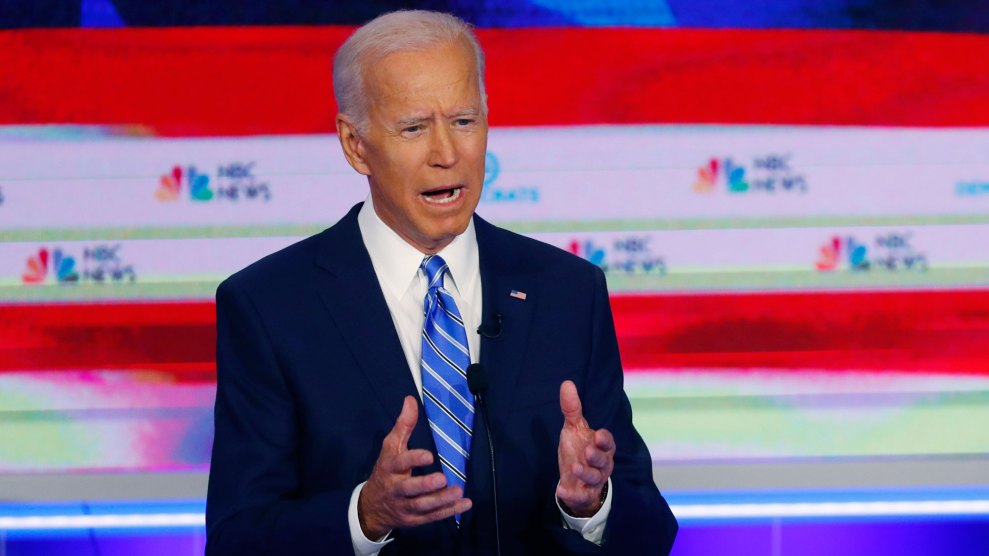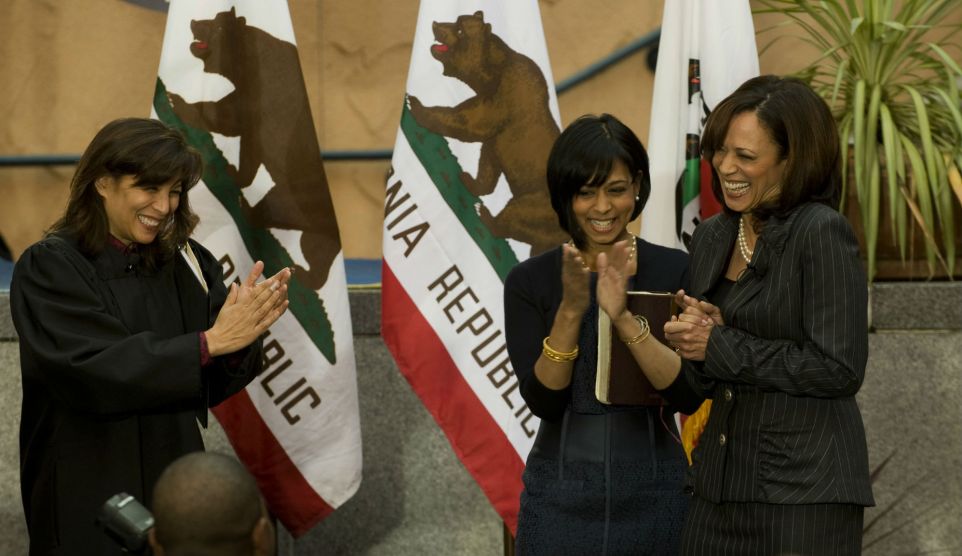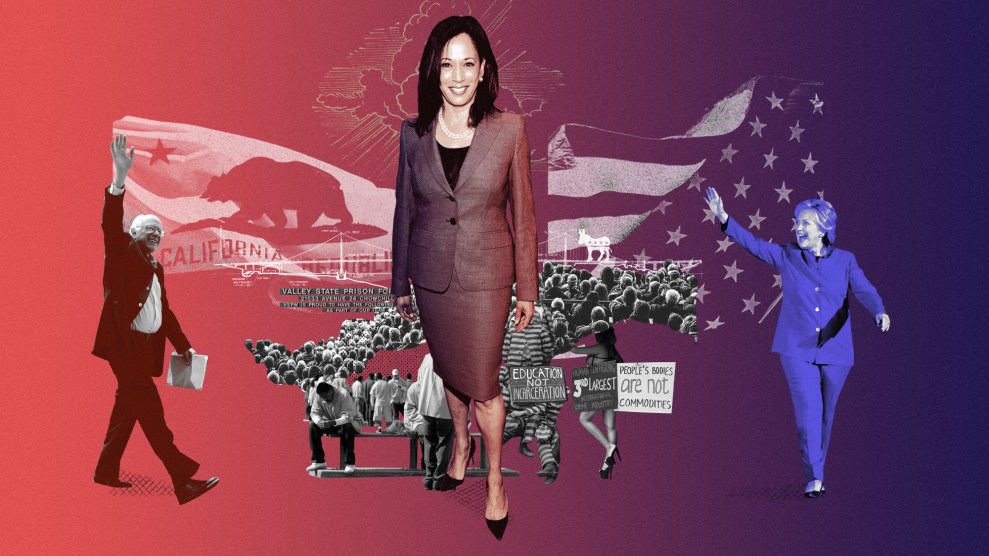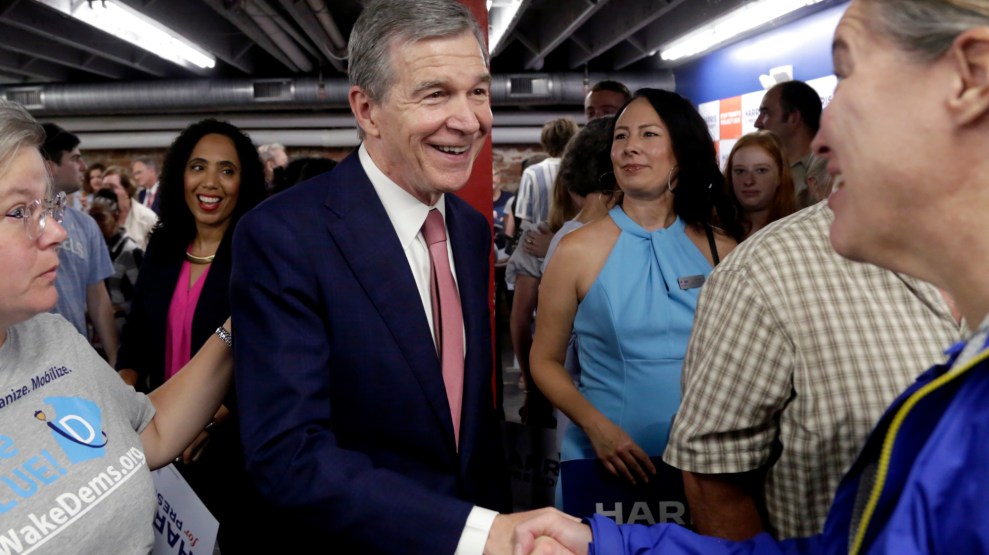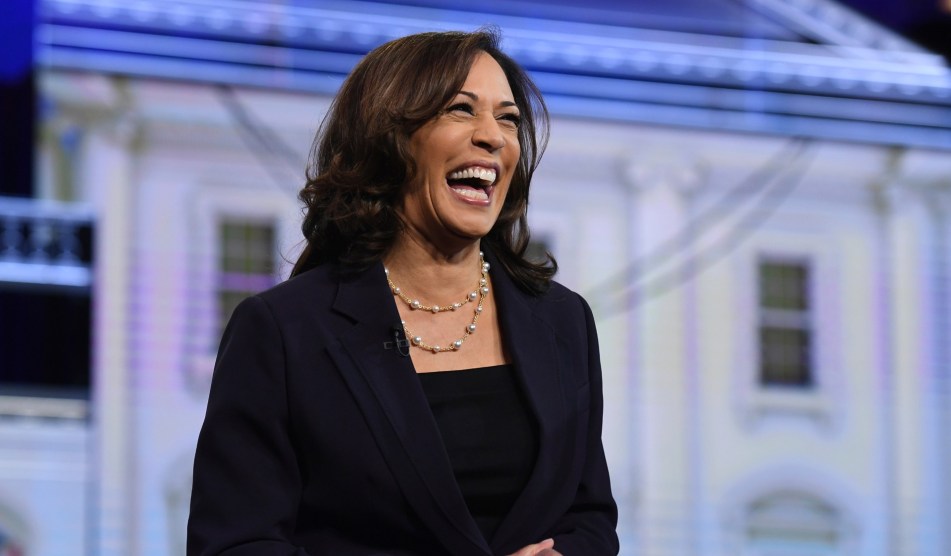
MediaPunch/AP
It hasn’t been an easy spring for the Kamala Harris campaign. The January launch was promising: a massive, 30,000-person rally in her hometown of Oakland; moving spirituals from the Oakland interfaith gospel choir and a performance by a samba funk band; more than a million in donations in 24 hours. A video announcement several days before the kickoff explained that her campaign’s color and design—a sort of retro purple, red, and white—were inspired by Shirley Chisholm, whose historic 1972 bid as the first black woman to run for president has long been cited as an inspiration for Harris. The whole thing was said to have rattled Donald Trump.
While it was clear then that Harris could draw a crowd, it was much less clear what she actually had to say. As the months wore on and other big names entered the race or rose in the ranks, notably Bernie Sanders, Elizabeth Warren, and then Joe Biden, Harris’ campaign started to seem almost like a footnote. She routinely came in fourth in the polls, unable to truly differentiate herself from the rest of the exceptionally large field. She was struggling to overcome her place as a deeply divisive figure on the left. The case she made in her memoir about being a progressive prosecutor didn’t exactly ring true, she seemed to flip-flop on health care, and, while she claimed that as a career prosecutor, she was the one person best trained to present the case against Trump, she often seemed reluctant to enter the ring.
Much of that changed on Thursday night in her first Democratic presidential primary debate. On a crowded stage, she emerged poised, smart, and ready to fight. But more importantly, last night also marked another turning point, as Harris reconciled something that she’s struggled with throughout her career, and in this campaign in particular: how to use her personal biography as a political weapon. It’s a challenge that every candidate faces, but is unique to Harris’ unique role in history.
In what will hands-down be remembered as a pivotal moment in the 2020 presidential election, and likely her career, Harris initiated a direct confrontation with frontrunner Joe Biden. She started with Biden’s recent whimsical recalling of his relationship with segregationist senators James Eastland and Herman Talmadge, and then pivoted to a deeply personal story of being in the second class to desegregate Berkeley’s public schools while then-Sen. Biden opposed the busing that made it possible. It was an exchange that put Biden on the defensive, and won widespread praise on Twitter.
As a reporter and San Francisco native who has followed Harris’ career since she was district attorney of my hometown, it’s hard to overstate just how jarring the moment was. Harris’ oratory wasn’t a surprise; she’s become pretty memeable in the Senate for her brutal questioning of several people in Trump’s orbit. What was different was how personal Harris got.
She doesn’t talk about herself often, which seems weird for someone in the public eye, but it’s true. Over the years she’s attributed this to her mother, Shyamala Gopalan, a woman who emigrated from India at 19 and went on to become a breast cancer researcher. “I was raised in a way that one does not talk about themselves or their feelings,” Harris, laughing, told The Cut in January. She grew up in an analytical household, sure, but perhaps more importantly, it was also one that was helmed by a dark-skinned immigrant woman with an Indian accent who was forced to fight her own battles every day.
That doesn’t mean Harris hasn’t tried to meaningfully use her personal biography. Her career is nothing if not a series of firsts: first black woman to be DA of San Francisco, first black woman to be attorney general of California, first Indian-American woman and second African-American woman to serve in the Senate. But she doesn’t dwell on those firsts often, and seems almost uncomfortable when they’re brought up, usually saying something along the lines of: My mother always taught us that it’s okay to be the first, but make sure you’re not the last. Her go-to introductory stump speech is about how her parents met while they were both student activists at the University of California at Berkeley, how she’d attend marches in her stroller and cry for “fweedom!” (It’s also something people in her world frequently share, and is included in many profiles of the senator, including my own.)
But note that these personal tidbits, doled out ever so carefully, are about race, but they’re not really about race. Like the Chisholm-inspired campaign colors, they checkmark the historical context of her life, but they’re facts, not feelings. There’s still a reserved quality that some voters have picked up on, one that’s probably sexist and unfair, but also real. There’s also the very real dismissal that women and people of color get from white establishments whenever they’re seen as too focused on their personal narrative, which is misread as playing in too deeply to “identity politics.” The unspoken critique is that they’re lazy, unqualified, and focused on themselves instead of the work. In an April interview with “Pod Save America,” Harris said such critiques are used to “shut people up.”
The phrase ‘identity politics’ is often used to either marginalize the topic of discussion or to shut people up. Not anymore. Where America stands on these issues is about America’s identity. pic.twitter.com/Ccu5s2wPhf
— Kamala Harris (@KamalaHarris) April 19, 2019
But too often, the only person who has been shut up has been Harris.
I experienced it firsthand when I interviewed her two years ago. Sure, the setting wasn’t exactly ideal; we were in a prison in California’s Central Valley and it was well over 100 degrees. In her answers that day, and thinking about her first book, Smart on Crime, what struck me was the almost clinical approach that she took to deeply personal problems. Almost everything is a math question with a perfectly logical answer. That book closely follows the re-entry program she’d developed for non-violent first-time offenders while DA of San Francisco. And to hear her talk about it, a person doesn’t sell drugs because they were “raised in poverty,” for instance, but because doing so was the only job available that paid more than minimum wage to people without high school diplomas. So her program focused on those high school diplomas and job training. One person I talked to who helped run the program remembered bringing Harris a study that showed how physical exercise could help improve job performance. Harris then worked out a deal to get free passes to 24-hour Fitness for participants. A gradate of the program told me how she was made to take so many resume-writing workshops that she could draw one up easily on her phone more than 10 years later.
I knew that Harris majored in economics at Howard, and that her father, Donald Harris, was a noted Stanford economist whose speciality was his homeland of Jamaica. I knew at times they had a fraught relationship. Harris’ parents divorced when she was young, she was raised primarily by her mother, and during her first run for political office, she told a reporter for the San Francisco Weekly, “He’s a good guy, but we’re not close.” She talks openly and warmly about her mother, who passed away from cancer in 2009, but rarely at all about her father, who is still very much alive. So I stumbled through a question that first day I met her about what, if any, influence he’d had on her approach to solving problems. It was not a question that she was particularly interested in answering. She kind of furrowed her brow, took a breath, and then pivoted to a fairly broad explanation of how hands-on she was as a prosecutor, showing up to crime scenes late at night, in order to see, feel, and hear what was going on in a case.
Harris is often compared to Barack Obama, but it’s a superficial and somewhat lazy comparison, at best. Yes, they’re both biracial, symmetrical, and went to law school, but they engage the public in very different ways. Harris has never spent much time worrying about who she was or where she fit in. She’s not wholly interested in bringing two sides of America together because it speaks to some innate struggle that parallels her own life. Sure, that speaks to her confidence. But it also speaks to how aware she is that her history is more complicated than what’s usually been palatable for American politicians, that her being a biracial black woman is complicated and not easy to reduce to a few inspirational soundbites.
“When I was DA and AG, reporters would come to me with this really original question, ‘so what it’s it like to be the first woman’ fill-in-the-blank,” she said with a hint of sarcasm on former Obama adviser David Axelrod’s podcast in 2017. “I’d look at them not knowing how to answer that question, and I would tell them ‘I don’t know how to answer that question because I’ve always been a woman, but I’m sure a man could do the job just as well.'”
In the same interview, Axelrod asked if Harris had a similar search for identity as Obama. “When journalists, for example, ask me to talk about that, what I usually say, David, is I’m happy to have that conversation, but if you want to have a conversation about race in this country, if you have about 4-5 days to put aside, then let’s go for it.”
Her perspective is probably best summed up in her second book, The Truths We Hold, where she writes that her Indian mother raised her and her sister as black girls, because Gopalan knew that’s how the world would see them. Finally, on stage in Miami Thursday night, Harris told the world who she is and what that means.
“There was a little girl in California that was bused to school,” Harris said, looking directly at Biden across the debate stage. “That little girl was me.”
This story is not a part of her regular stump speech. It only appears in her book as a passing historical fact, one that is covered rarely, though a local Berkeley paper expanded on it when she announced her candidacy.
For Harris’s campaign, Thursday’s moment wasn’t just a triumphant one, but a meticulously executed one. Within minutes of her showdown with Biden, Harris’ campaign sent out a fundraising email, social media assets, and as of Friday morning, t-shirts for sale with a picture of school-age Kamala. What it all says is that after what was certainly much deliberation, Harris’ team finally found a way to hold up before everyone her most valuable truth: herself.

